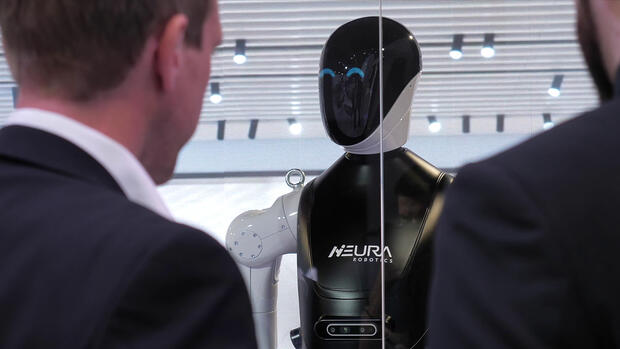Scientists and companies around the world are working on how to teach robots processes that living beings can intuitively master.
(Photo: Neura Robotics)
Berlin Their names are Maira, Lara or Mipa; they can weld, pack and equip machines. The robots have in common that, thanks to many sensors and artificial intelligence, they can hear and see and are touch-sensitive to a certain extent.
“Only cognitive robots have the potential to conquer the world outside of industry,” says David Reger, founder and boss of the manufacturer Neura Robotics. This can be seen in the shortage of skilled workers in the service sector, especially in care, but also in the household.
According to the company from Swabian Metzingen, it has orders worth more than 450 million dollars. To be able to meet these, investors are now putting $55 million in venture capital into the company, as announced on Wednesday.
Neura Robotics has already raised $140 million
The money will go toward expanding production capacity to build the robots ordered, as well as expanding into the US and Japan. Neura Robotics has raised a total of more than $140 million from investors since it was founded in 2019.
The company did not want to say whether the company’s valuation rose with the new round and where it is currently at all. Many so-called deep-tech companies are currently finding it difficult to raise financing rounds given the reluctance of investors.
“Cooperative, decentralized and semi-autonomous robot systems with a completely new approach are needed to open up the many thousands of use cases,” said Stefan Fritz, partner at the German deep-tech investor Primepulse, explaining his participation in the round. Lingotto, the investment arm of the Italian Agnelli family, as well as Vsquared Ventures and HV Capital were also involved.
>> Read more here: AI massively accelerates the development of autonomous work robots
Neura Robotics sees itself as a pioneer in the field of cognitive robotics. These are robots that are able to interact and learn with their environment through the use of artificial intelligence, intelligent sensors and software systems.
The market researcher Spherical Insights estimates the size of the market last year at around 4.7 billion dollars. The experts expect growth of almost one fifth within ten years.
Germany brings location advantages
In the field of the robot industry, founder David Reger sees the location in Germany as an advantage. “In just two years, our team has succeeded in developing and producing all the sensors and components for a new generation of robots from scratch,” said Reger. He wasn’t sure if that would have been possible anywhere else in the world.
The Neura Robotics founder sees a location advantage in Germany.
(Photo: Neura Robotics)
Lingotto partner Nikhil Srinivasan agreed: “Neura works at the interface of AI and hardware development. Germany and Europe have a particular advantage here.” Other well-known robot start-ups from Germany are Agile Robots from Munich and Wandelbots from Dresden.
Depending on the industry and model, the Neura robots cost between 5,000 and 40,000 euros. In addition, Neura Robotics has developed the Neuraverse platform, which is designed to help companies implement automation processes more cheaply and flexibly. Customers include the Japanese robot manufacturer Kawasaki.
“Our platform philosophy is based on the same idea that made the smartphone so successful. Anyone can develop applications, i.e. apps, for our robots in the future,” said Reger.
More and more companies, research institutions and start-ups around the world are now working on how robots can be taught processes that living beings can intuitively master. However, Reger described his platform idea as unique: “A robotics company that also offers such a versatile cognitive platform would of course be a competitor. But I don’t know of any at the moment.”
However, companies such as the Zurich start-up Anybotics as well as Covariant and Boston Dynamics from the USA already have cognitive robots on offer.
More: The hardware of the future for AI could come from Europe
